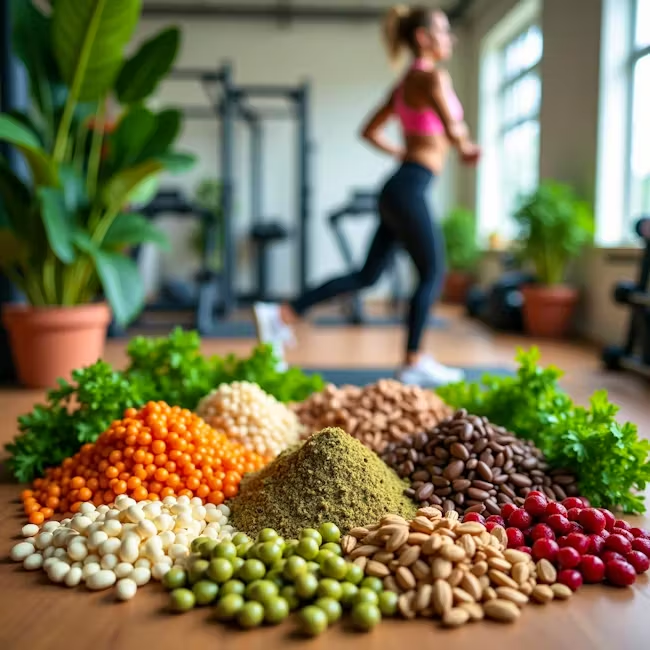When it comes to achieving fitness goals, protein is often the top priority. For years, athletes and fitness enthusiasts have relied on animal-based protein sources to fuel their bodies. However, with the growing awareness of the importance of sustainability and environmental consciousness, many are turning to plant-based proteins as a more eco-friendly alternative. But what exactly are plant-based proteins, and how can they benefit your fitness journey? In this article, we’ll delve into the world of plant-based proteins, exploring their benefits, eco-friendly sources, and how to incorporate them into your fitness routine for optimal results.
1. What are Plant-Based Proteins and Why are They Important for Fitness?
Plant-based proteins are derived from various plant sources such as legumes, beans, nuts, and seeds. They provide essential amino acids that the human body needs to build and repair muscles, making them a crucial component of a fitness diet. Plant-based proteins are just as effective as animal-based proteins in promoting muscle growth and recovery, but they offer additional benefits that make them an attractive option for fitness enthusiasts.
One of the primary reasons plant-based proteins are important for fitness is that they are often lower in saturated fat and higher in fiber compared to animal-based proteins. This makes them a heart-healthy option that can help reduce the risk of chronic diseases such as heart disease and diabetes. Additionally, plant-based proteins tend to be rich in antioxidants and phytochemicals, which can help protect against oxidative stress and inflammation in the body.
Some examples of plant-based proteins include pea protein, rice protein, and hemp protein. These proteins are easily digestible and can be absorbed by the body quickly, making them an excellent option for post-workout recovery. Furthermore, plant-based proteins are often environmentally friendly and sustainable, requiring less water and land to produce compared to animal-based proteins.
Overall, plant-based proteins are a nutritious and sustainable option for fitness enthusiasts who want to build muscle and promote overall health and well-being. By incorporating plant-based proteins into their diet, individuals can experience the benefits of a balanced and healthy lifestyle.
2. The Benefits of Plant-Based Proteins for Fitness and Nutrition
When it comes to fitness and nutrition, protein is a crucial component that plays a vital role in building and repairing muscles. Plant-based proteins are an excellent alternative to animal-based proteins, offering numerous benefits for overall health and well-being. One of the significant advantages of plant-based proteins is their ability to provide all the essential amino acids that the body needs to build and repair tissues.
Unlike animal-based proteins, plant-based proteins are often lower in saturated fats and higher in fiber, making them an excellent choice for those looking to manage their weight and improve their overall health. For instance, legumes such as lentils and chickpeas are rich in protein, fiber, and various essential vitamins and minerals, making them an excellent addition to a fitness diet.
Additionally, plant-based proteins are often easier to digest than animal-based proteins, which can be beneficial for individuals with sensitive stomachs or those who experience digestive issues. Tofu and tempeh, for example, are excellent sources of protein that are low in calories and rich in nutrients, making them an excellent choice for those looking to manage their weight.
Furthermore, plant-based proteins have been shown to have numerous health benefits, including reducing the risk of heart disease, type 2 diabetes, and certain types of cancer. Seitan and veggie burgers are excellent sources of protein that are low in saturated fats and high in fiber, making them an excellent choice for those looking to improve their overall health and well-being.
Overall, plant-based proteins offer numerous benefits for fitness and nutrition, making them an excellent choice for those looking to improve their overall health and well-being. With so many plant-based protein options available, it’s easy to incorporate these nutritious foods into your diet and start experiencing the benefits for yourself.
3. Exploring Eco-Friendly Protein Sources: Plant-Based Options for a Sustainable Lifestyle
As the world becomes increasingly aware of the environmental impact of food production, it’s essential to consider the eco-friendliness of protein sources. Plant-based proteins offer a sustainable alternative to animal-based options, reducing greenhouse gas emissions and conserving natural resources. Some of the most eco-friendly plant-based protein sources include:
Legumes, such as lentils, chickpeas, and black beans, which require minimal water and land to produce. They also have a lower carbon footprint compared to animal-based proteins and can help reduce soil erosion.
Nuts and seeds, like almonds, chia seeds, and hemp seeds, which are rich in protein and require less water to produce than many other protein sources. They also provide a natural source of healthy fats and fiber.
Whole grains, such as quinoa, brown rice, and whole wheat, which are not only high in protein but also rich in fiber, vitamins, and minerals. They also require less water and pesticides compared to many other grains.
Plant-based protein powders, made from sources like pea protein, hemp protein, and brown rice protein, offer a convenient and sustainable way to boost your protein intake. Look for powders that are certified organic and non-GMO to ensure they align with your values.
By incorporating these eco-friendly protein sources into your diet, you’ll not only be supporting a more sustainable food system, but you’ll also be nourishing your body with the protein it needs to thrive. Whether you’re a fitness enthusiast or simply looking to live a healthier lifestyle, plant-based proteins offer a sustainable solution for a better tomorrow.
4. The Impact of Animal-Based Protein on the Environment: A Comparison Study
When it comes to protein sources, the environmental impact of animal-based options cannot be ignored. A comparison study between animal-based and plant-based proteins reveals some alarming statistics. Animal agriculture is a significant contributor to greenhouse gas emissions, with beef and lamb producing 19.2 and 20.4 kilograms of CO2 equivalent per kilogram of protein, respectively. In contrast, plant-based protein sources such as tofu, lentils, and chickpeas produce significantly less, with an average of 0.3-0.7 kilograms of CO2 equivalent per kilogram of protein.
The water usage required for animal-based protein production is also substantial. For example, it takes 1,000 gallons of water to produce just one pound of beef, whereas plant-based protein sources require significantly less water, with 25 gallons of water needed to produce one pound of wheat. Additionally, animal agriculture is a leading cause of deforestation, with millions of acres of land being cleared each year for grazing and feed crop production.
In contrast, plant-based protein sources require minimal land use and can even help to promote reforestation efforts. Furthermore, animal agriculture is a significant source of water pollution, with fertilizers and pesticides used in feed crop production contaminating waterways. By choosing plant-based protein sources, individuals can significantly reduce their environmental footprint and contribute to a more sustainable food system.
5. How to Incorporate Plant-Based Proteins into Your Fitness Routine for Optimal Results
Incorporating plant-based proteins into your fitness routine can be a game-changer for your overall health and performance. To get the most out of plant-based proteins, it’s essential to understand how to incorporate them into your daily routine. Start by assessing your protein needs, which vary depending on your fitness goals and current activity level. Typically, athletes and individuals who engage in regular exercise require more protein to support muscle growth and repair.
Choose a variety of plant-based protein sources, including legumes, beans, lentils, tofu, tempeh, and seitan. These foods are not only rich in protein but also packed with fiber, vitamins, and minerals. For example, you can start your day with a bowl of oatmeal with almond milk, banana, and walnuts, which provides a boost of protein and complex carbohydrates to fuel your workout.
Incorporate plant-based protein powder into your routine, especially after your workouts. Look for a protein powder that is made from a single source, such as pea or hemp protein, and is low in added sugars and artificial ingredients. You can also use plant-based protein powder as a supplement to support muscle growth and recovery.
Timing is everything when it comes to consuming plant-based proteins. Aim to consume a source of protein within 30-60 minutes after your workout, when your muscles are most receptive to nutrient uptake. This can help promote muscle growth and repair, and support overall recovery.
By incorporating plant-based proteins into your fitness routine, you can support your overall health and performance while also reducing your environmental impact. Remember to stay hydrated and listen to your body, and you’ll be on your way to achieving your fitness goals with the power of plant-based proteins.
6. Tips for Choosing the Best Plant-Based Protein Supplements for Your Fitness Needs
When it comes to selecting the right plant-based protein supplement for your fitness needs, it can be overwhelming with the numerous options available in the market. However, by considering a few key factors, you can make an informed decision that aligns with your fitness goals and dietary preferences.
Look for a supplement that is made from a single source of protein, such as pea, rice, or hemp, to minimize the risk of cross-contamination with other allergens. Additionally, opt for a supplement that is certified organic or non-GMO to ensure that you are getting a high-quality product that is free from harsh chemicals and pesticides.
Consider the protein content and absorption rate of the supplement. A higher protein content does not always translate to better results, as the body can only absorb a certain amount of protein at a time. Look for a supplement that has a balanced protein content and a slow absorption rate to provide a sustained release of amino acids throughout the day.
Another important factor to consider is the brand’s transparency and manufacturing process. Look for a brand that is transparent about their sourcing and manufacturing process, and that adheres to Good Manufacturing Practices (GMPs) to ensure the quality and purity of the supplement.
Finally, read reviews and do your research before making a purchase. Check online reviews from other customers who have used the supplement, and look for third-party testing and certification from reputable organizations such as NSF International or the International Society for Sports Nutrition (ISSN).
7. Creating a Sustainable Fitness Journey: Maximizing Plant-Based Proteins for Long-Term Success
When it comes to creating a sustainable fitness journey, incorporating plant-based proteins is crucial for long-term success. A well-planned plant-based diet can provide all the necessary nutrients for optimal fitness and overall health. Consistency is key, and making plant-based proteins a staple in your diet can help you achieve your fitness goals.
To maximize the benefits of plant-based proteins, focus on variety and balance. Include a mix of legumes, nuts, seeds, and whole grains in your diet to ensure you’re getting all the essential amino acids. Experiment with different plant-based protein powders and supplements to find what works best for you.
In addition to a balanced diet, proper hydration is essential for a sustainable fitness journey. Aim to drink at least eight glasses of water per day, and consider incorporating electrolyte-rich beverages to replenish lost salts during intense workouts.
Another important aspect of a sustainable fitness journey is recovery and rest. Adequate rest and recovery allow your body to repair and rebuild muscle tissue, making it essential for progress and long-term success. Prioritize getting enough sleep each night and take rest days as needed to avoid burnout and injury.
By incorporating these tips into your fitness routine, you can create a sustainable journey that not only benefits your health but also the environment. Small changes add up, and making plant-based proteins a priority is a great step towards a more sustainable lifestyle.





